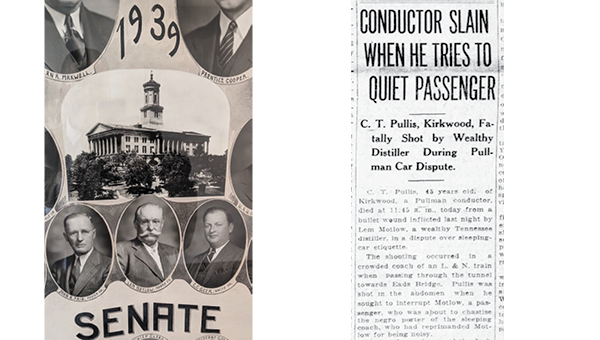Lem Motlow’s murder trial was a century ago
Published 3:51 pm Thursday, March 14, 2024
|
Getting your Trinity Audio player ready...
|
By Bill Carey
One of the most powerful men in Tennessee was indicted for murder a hundred years ago this month.
Lem Motlow, then the owner of the Jack Daniel’s Distillery, was accused of murdering Clarence Pullis, a porter on the Louisville and Nashville Railroad, on March 17, 1924.
Motlow had boarded an eastbound train heading from St. Louis to Nashville that night. He had been drinking before he boarded the train, although how much he drank was a matter of dispute in his subsequent trial.
Shortly after Motlow boarded, a Black railroad porter named Ed Wallis told him to present his ticket. Motlow objected, using a racial epithet commonly used in that era, according to his defense attorneys in the subsequent trial. Motlow and Wallis then had a physical altercation (again, the nature of which was also a matter of dispute in the trial).
Pullis, who was white, tried to separate Motlow and Wallis. Motlow pulled a loaded handgun from his pocket and fired, intending to kill Wallis, but accidentally killing Pullis.
Motlow was accused of first-degree murder. He hired a team of the best lawyers he could find, which included (among others) Frank P. Bond and Seth Walker of Nashville.
Motlow’s trial took place in St. Louis in early December. The courtroom was packed and included (among others) Tennessee Governor Austin Peay of Tennessee and former Tennessee Governor Malcom Patterson of Tennessee. Both Peay and Patterson served as character witnesses for the Tennessee millionaire. “Lem Motlow’s reputation is excellent, none above it,” said Peay.
In 1924, the Ku Klux Klan was at the height of its power, and racial segregation was required all over the South. Motlow’s legal team tried to convince the all-white jury that he had fired in self-defense after being attacked by Wallis, and that Pullis was the unfortunate victim of a misfire. Using a strategy and language that wouldn’t be allowed in a courtroom today, attorney Bond painted a picture of Wallis as an insolent troublemaker.
“There are two classes of negroes,” Bond told the jury, according to the December 11, 1924, St. Louis Post Dispatch. “One class regrets that it cannot share social equality and social privileges with the white race. . . To him social privileges means that white folks attend upon him. He is pert and offensive in his manner.”
There was an eyewitness to the shooting who claimed that Wallis did not attack Motlow. The character of that eyewitness, Joseph Broida of St. Louis, was disparaged by Motlow’s attorneys. In fact, they referred to Broida as a “Russian Jew.”
The jury found Motlow not guilty – a verdict that was greeted with praise in the South and heavily criticized in the North. “The ghost of Pullis will haunt him [Motlow] for the rest of his days,” said the Belleville [Illinois] News Democrat.
Did it haunt him? Not as much as might have appeared at the time. The ghost of Clarence Pullis didn’t stop Motlow from continuing to operate the Jack Daniels Distillery in Lynchburg, which he owned until his death in 1947.
The ghost of Clarence Pullis didn’t stop Motlow from being elected to the Tennessee House of Representatives in 1932 and the Senate six years later.
The ghost of Clarence Pullis hasn’t hurt the success of the Jack Daniels Distillery, which has been owned by the Brown-Foreman Company since 1956.
The ghost of Clarence Pullis didn’t stop the Tennessee General Assembly from naming the tunnel that connected Legislative Plaza to the State Capitol after Lem Motlow and his son Reagor in 1959.
Finally, the ghost of Clarence Pullis hasn’t kept the story of his death in the public sphere. The St. Louis Post Dispatch has done several stories over the years looking back at the trial. But I think it is safe to say that few people in Tennessee know about the Motlow trial, and it is certainly not talked about among tour guides in Lynchburg. To this day there is no mention of Lem Motlow’s murder trial on either his Wikipedia page or that of the Jack Daniels Distillery.
However, I do know that, during Motlow’s lifetime, his colleagues were very aware of what happened on the eastbound train that headed east from St. Louis on March 17, 1924. Around 2003, I interviewed Nashville attorney James O. Bass, who had served in the General Assembly at the same time as Lem Motlow. Bass, who was about 90 years old at the time, recalled a debate at the General Assembly where he was asked to speak on behalf of Lem Motlow, because it was an awkward subject for someone with “Motlow’s legal past,” Bass said.
I asked Bass what he meant by that statement, and he told me about what happened on the train in 1924. That was the first time that I’d ever heard of Motlow’s murder trial.
So to some degree, the ghost of Pullis did “haunt” Motlow.






